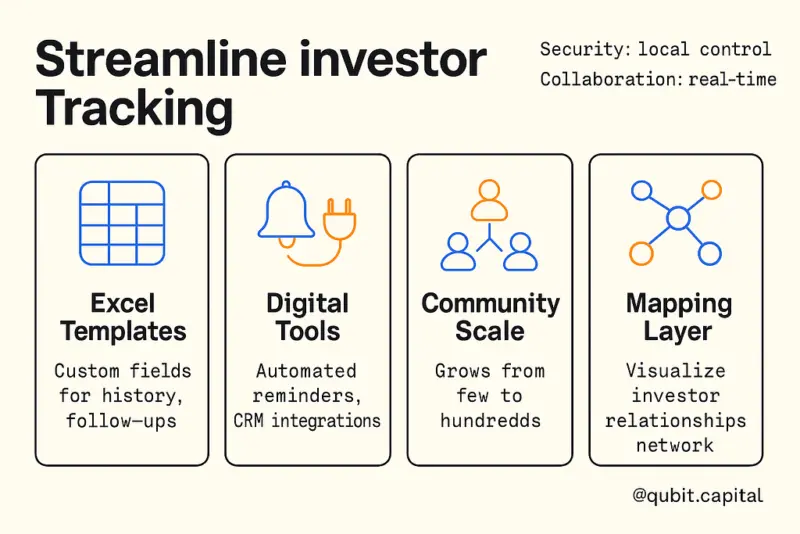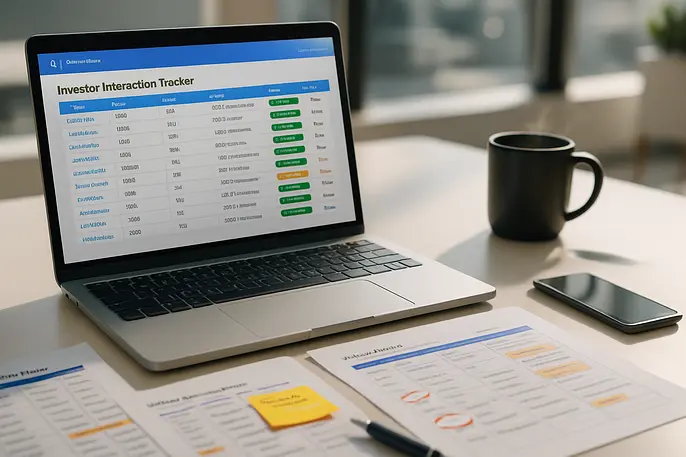Managing investor tracking gets messy fast. One missed follow up, one forgotten note, and a warm conversation turns into a cold thread you cannot recover.
This is not only a founder problem. In recent research, 40% of companies fail to track active shareholders after they stop investing. That blind spot explains why relationships lapse, updates slip, and future rounds start from zero.
To make this easier, here are 15 customizable templates built to run investor interactions like a system. You can track who you spoke to, what they care about, what you promised, and what happens next, without juggling scattered docs.
Whether you use Excel, Google Sheets, or a community tool, these templates will help you stay organized, follow up on time, and keep investor communication consistently sharp. Let’s dive in.
Streamline Investor Tracking with Excel Templates and Digital Tools
Customizable templates make investor tracking simple. You capture contact info, preferences, conversation history, and follow-ups in one place, so nothing gets lost. Spreadsheets work well because they are flexible, fast to update, and easy to share internally.
Structured tracking can improve outcomes, not only organization. Companies with consistent, high-quality investor communications are 40% more likely to secure follow-on funding at favorable terms. That is why templates matter, because they keep updates and follow-ups consistent.
Excel is a strong option if you want local control. Sensitive details stay on your device or internal drive, which can feel safer than scattering links across multiple tools. The tradeoff is manual work, which is where digital tools can help.
Use digital tools to support the spreadsheet, not replace the discipline. Add automation for reminders, connect notes to your CRM, and segment investors by persona so outreach stays relevant. If your list grows large, accuracy becomes the bottleneck.
If your investor list crosses 500 entries, consider tools with deduplication and access controls. That keeps the database clean, and it limits who can view sensitive notes.
- Excel Investor Summary Template: Use this when you want a quick snapshot of each investor and what matters to them.
- CRM Investor Management Sheet: Use this when you need pipeline stages, owners, follow-up dates, and a clear next step.
Your approach to managing investor communications is enriched by the context provided in AI tools for fundraising, which offers a comprehensive perspective on AI-driven innovations in fundraising.

However, digital tools can complement Excel by introducing advanced features like automated reminders and integration with CRM platforms. Insights from investor segmentation tools can further refine your tracking methods, enabling you to categorize investors based on personas and tailor your outreach strategies effectively.
AI-powered platforms and templates have led to major fundraising milestones. Genesis AI secured a $105 million seed round, co-led by Eclipse and Khosla Ventures. This underscores strong institutional interest in AI and robotics, demonstrating how adoption of specialized investor discovery tools can attract top-tier financial partners.
Community recommendations often highlight the scalability of these systems. Whether you're managing a handful of investors or hundreds, the ability to adapt your tracking framework ensures long-term usability. For a more structured approach, the detailed process described in how to build an investor map intersects naturally with your methods for tracking investor interactions, adding a structural layer to your strategy.
Local vs. Cloud-Based Investor Tracking Tools
Investor Tracking Templates for Effective Management
Templates are not busywork. They help you run investor relationships like a system, which directly improves speed and outcomes. According to a 2024 DocSend survey, startups that provide regular investor updates secure subsequent funding rounds 2.5 times faster than startups that do not.
Our investor tracking templates simplify how you manage conversations, follow-ups, and updates. You get a cleaner workflow, fewer missed touchpoints, and a more professional investor experience.
Template development is evolving. In 2024, NZIF 2.0 was developed after consultation with more than 200 investors, illustrating the rise of investor-driven framework design. This approach strengthens adoption and engagement.
Here is what you can use:
1. Qubit Capital for AI-Driven Investor Discovery
Qubit Capital revolutionizes investor discovery through artificial intelligence and data-driven matchmaking. This platform goes beyond traditional spreadsheet tracking by leveraging machine learning algorithms to analyze your startup's profile against a database of 20,000+ investors across venture capital, private equity, and corporate investment sectors.
The platform's core strength lies in its relevancy scoring system, which evaluates potential investors based on investment history, sector preferences, check sizes, and geographic mandates. Rather than overwhelming you with lengthy contact lists, Qubit Capital prioritizes high-probability matches, enabling focused outreach efforts. The system tracks $215+ million raised across 64+ funding rounds since 2020, demonstrating proven effectiveness.
Key features include automated investor discovery, personalized outreach templates, integrated data rooms for due diligence, and comprehensive analytics dashboards. The platform seamlessly integrates with existing CRM systems and email clients, ensuring smooth workflow adoption without disrupting current processes.
2. CRM Templates for Investor Management
Customer Relationship Management (CRM) templates specifically designed for investor relations provide centralized contact management with specialized fields for investment preferences, communication history, and follow-up scheduling. These templates typically include investor profile sections covering investment thesis, portfolio companies, check size ranges, and decision-making processes.
The most effective CRM templates incorporate automated workflow triggers that prompt follow-ups based on predefined timelines and investor interaction patterns. They feature customizable pipeline stages reflecting fundraising progression from initial contact through term sheet negotiation and closing. Advanced templates include integration capabilities with email marketing platforms and calendar scheduling tools.
Critical fields include investor classification (angel, VC, strategic), investment stage preferences, industry focus areas, geographic restrictions, and response tracking metrics. The templates should accommodate team collaboration features, enabling multiple team members to update investor interactions while maintaining data consistency and avoiding duplicate outreach efforts.
For those looking to enhance investor interactions, the analysis found in cold outreach investor tools aligns with your focus on investor interactions by highlighting techniques that boost engagement in early outreach phases.
3. Budgeting Templates for Financial Planning
Comprehensive budgeting templates designed for fundraising scenarios include detailed expense forecasting, cash flow projections, and scenario planning capabilities. These templates typically feature automated calculations for runway extension, burn rate optimization, and funding requirement analysis across different growth scenarios.
The most sophisticated budgeting templates incorporate sensitivity analysis features, allowing startups to model various funding amounts and their impact on company trajectory. They include pre-built formulas for common startup metrics including customer acquisition cost, lifetime value calculations, and unit economics modeling.
Essential components include monthly cash flow projections extending 18-24 months, detailed expense categorization covering personnel, marketing, operations, and technology costs, and milestone-based funding requirements tied to specific business objectives. The templates should integrate with accounting software and provide exportable reports suitable for investor presentations.
4. Expense Tracking Templates
Expense tracking templates provide essential infrastructure for startups managing investor funds and demonstrating financial transparency throughout fundraising and post-investment phases. These specialized templates go beyond basic bookkeeping to offer sophisticated cost categorization, budget variance analysis, and real-time spending visibility that investors expect from professionally managed companies.
Advanced templates feature multi-dimensional expense tracking that captures amount, category, project allocation, and ROI correlation, enabling startups to demonstrate efficient capital deployment and identify optimization opportunities.
Modern expense tracking templates integrate seamlessly with popular accounting platforms including QuickBooks, Xero, and FreshBooks, ensuring automated data flow into financial reporting systems while eliminating manual entry errors. The templates typically include receipt management systems, mobile-friendly interfaces for real-time expense capture, and approval workflows that maintain spending controls. Automated alert systems notify management when spending approaches predetermined thresholds, helping prevent budget overruns while demonstrating proactive financial management to investors.
5. Investor Communication Templates
Clear and consistent communication is key to building trust with investors. Communication templates streamline the process of drafting emails, reports, and presentations. By using pre-designed formats, you can ensure professionalism and save time.
You uncover additional nuances in personalization when considering the approaches outlined in AI personalizing investor outreach, which dovetails with your investor tracking practices.
6. Portfolio Management Templates
Portfolio management templates serve dual purposes: tracking your own investment activities and understanding investor portfolio contexts for better positioning. These templates feature comprehensive asset allocation tracking, performance monitoring across different investment vehicles, and risk assessment calculations.
For startups, portfolio templates help analyze investor portfolios to identify investment patterns, sector preferences, and potential synergies with existing portfolio companies. The templates include fields for tracking investor portfolio performance, recent exits, and active investment areas to inform outreach strategies.
Advanced portfolio templates incorporate automated performance calculations, including internal rate of return (IRR—a measurement of annual return) and multiple on invested capital (MOIC—the ratio of investment gains to amount invested), and time-weighted returns.
They feature visual dashboards displaying portfolio composition, sector allocation, and geographic distribution of investments.
7. Investor Mapping Templates
Investor mapping templates create visual representations of your target investor universe, organizing contacts by investment criteria, relationship strength, and outreach priority. These templates typically feature hierarchical organization structures showing warm connections, referral paths, and networking opportunities.
The most effective mapping templates include relationship scoring systems that track connection strength, mutual contacts, and introduction pathways. They incorporate geographic visualization features for location-based investor targeting and event-driven outreach coordination.
Key components include investor classification matrices, referral pathway documentation, networking event tracking, and relationship warming strategies. The templates should accommodate both individual investor profiles and firm-level analysis, including decision-making hierarchies and investment committee structures. The perspective offered through investor mapping tools provides supplementary insights that reinforce your systematic approach to monitoring investor interactions.
8. Reporting Templates for Transparency
Investor reporting templates ensure consistent, professional communication throughout the fundraising process and post-investment relationship management. These templates standardize financial reporting, milestone updates, and strategic communications to maintain investor confidence and engagement.
Comprehensive reporting templates include automated data visualization features, pulling information from connected financial systems to create professional investor updates. They feature customizable sections for key metrics, operational highlights, challenges, and strategic initiatives.
Essential elements include standardized formatting for financial statements, KPI dashboards, milestone tracking, team updates, and forward-looking guidance. The templates should accommodate both monthly investor updates and formal quarterly reports, with scalable complexity based on investor sophistication levels.
9. Risk Assessment Templates
Risk assessment templates provide structured frameworks for identifying, evaluating, and mitigating potential challenges that could impact investment attractiveness or business operations. These templates help startups proactively address investor concerns and demonstrate sophisticated risk management approaches.
The templates typically include risk categorization systems covering market risks, operational risks, financial risks, and regulatory risks. They feature probability and impact scoring matrices that prioritize risk management efforts and resource allocation decisions.
Advanced risk templates incorporate scenario planning capabilities, stress testing financial models under different risk scenarios, and mitigation strategy documentation. They should include regular review schedules and escalation procedures for emerging risks.
10. Meeting Agenda Templates
Professional meeting agenda templates ensure productive investor interactions by providing structured frameworks for pitch meetings, due diligence sessions, and ongoing investor communications. These templates maximize meeting effectiveness while demonstrating organizational sophistication.
Effective agenda templates include pre-meeting preparation checklists, time allocation guidelines for different presentation sections, and post-meeting follow-up procedures. They accommodate various meeting types from initial introductions through board meetings and strategic planning sessions.
11. Contract Management Templates
Contract management templates streamline the complex legal aspects of investor relationships, from initial term sheets through final investment agreements. These templates provide organized systems for tracking legal documentation, negotiation points, and compliance requirements throughout the investment process.
The templates typically include term sheet comparison matrices that evaluate multiple investor offers across key dimensions including valuation, liquidation preferences, board composition, and investor rights. They feature timeline tracking for legal milestone completion and deadline management for time-sensitive negotiations.
Critical components include document version control systems, legal counsel coordination workflows, and signature tracking mechanisms. Advanced templates incorporate automated reminders for contract renewals, compliance deadlines, and reporting obligations to maintain ongoing investor relationship requirements.
Efficiency remains a key advantage. Stable frameworks allow up to 96% of responses to be prefilled from recent years, drastically boosting update accuracy and workflow speed for 2025.
12. Performance Tracking Templates
Performance tracking templates provide systematic approaches to monitoring and reporting key business metrics that investors use to evaluate company progress. These templates ensure consistent data collection and presentation across different reporting periods and investor communications.
The most sophisticated tracking templates feature automated data integration from various business systems including CRM platforms, financial software, and operational databases. They include benchmarking capabilities that compare performance against industry standards and peer companies.
Essential metrics include revenue growth rates, customer acquisition metrics, operational efficiency indicators, and financial health measurements. The templates should accommodate both quantitative metrics and qualitative milestone tracking, providing comprehensive views of business performance across multiple dimensions.
13. Fundraising Templates
Comprehensive fundraising templates encompass the entire capital raising process from initial planning through successful closing. These templates provide structured approaches to fundraising strategy development, investor outreach coordination, and process management across extended timeline requirements.
The templates typically include fundraising timeline planning tools that coordinate multiple parallel activities including pitch deck development, financial model preparation, legal documentation, and investor outreach campaigns. They feature milestone tracking systems that monitor progress against fundraising objectives and timeline requirements.
Key components include investor pipeline management, due diligence preparation checklists, fundraising expense tracking, and post-closing integration planning. Advanced templates incorporate fundraising analytics that optimize outreach timing, message personalization, and follow-up strategies based on investor response patterns.
Innovation shapes investor preferences. In recent surveys, 31% of respondents cite AI and technology utilization as key characteristics of a winning company in 2025, reinforcing the value of smart templates.
14. Tax Planning Templates
Tax planning templates address the complex regulatory and financial implications of investment transactions for both startups and investors. These templates help ensure compliance with tax obligations while optimizing structures for favorable treatment across different jurisdictions and investor types.
The templates typically include scenario modeling for different investment structures, timing optimization for tax-efficient transactions, and documentation requirements for various tax elections and filings. They feature automated calculations for common tax implications including stock option planning and investor tax considerations.
Essential elements include quarterly tax planning workflows, annual compliance checklists, and coordination templates for working with tax professionals and legal counsel. The templates should accommodate multiple entity structures and international considerations for global investment scenarios.
Investor sentiment is growing more optimistic. 54% of investors expect overall investment activity to recover by the first half of 2025. As a result, adopting advanced tracking templates now positions users to benefit from rising opportunities.
15. Exit Strategy Templates
Preparing for an exit requires careful planning. Exit strategy templates offer guidelines for evaluating options, setting goals, and executing plans. These templates are ideal for businesses looking to maximize returns during transitions.
By incorporating these templates into your workflow, you can streamline investor management and enhance your financial operations. Whether you’re focusing on CRM functionalities or expense tracking, these tools provide the structure and efficiency needed to succeed.
Fundraising Document Readiness: The 'Mise En Place' Approach
Building on these specialized templates, founders should adopt a 'Mise En Place' approach to fundraising document readiness. This strategy involves preparing all essential materials before investor outreach, including financial statements, pitch decks, and business plans. By organizing documents in advance, teams can respond quickly to investor requests and streamline the fundraising process. This proactive preparation increases confidence and ensures a smoother experience during investor interactions.
Using Mentor Networks for Warm Investor Introductions
- Identify mentors and advisors with relevant investor connections who can facilitate introductions for your fundraising efforts.
- Prepare concise, forwardable email templates that clearly outline your business, funding needs, and value proposition.
- Request mentors to personalize and forward your email, increasing credibility and engagement with targeted investors.
Conclusion
Implementing investor tracking templates can simplify your workflow and enhance investor relations for long-term success. We encourage you to implement these templates to strengthen your communication and build lasting relationships with investors. If you're ready to connect with the right investors, we invite you to explore our Investor Discovery and Mapping service for data-driven insights.
Key Takeaways
- Utilize free, customizable templates to streamline investor interaction tracking.
- Use both Excel and Google Sheets to maintain data control and enable collaborative tracking.
- Incorporate community recommendations to continuously improve your templates.
- Apply specialized templates for CRM, budgeting, and expense logging to cover all financial aspects.
- Optimize your investor tracking strategy with actionable insights and expert guidance.
Frequently asked Questions
How do investor tracking templates improve investor relations?
Investor tracking templates help organize communication history and follow-up schedules. This ensures timely responses and builds stronger investor relations.






